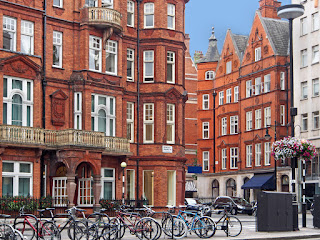Over several decades, London has established itself firmly as a global city to rival any other. Reflecting this, London property has also become one of the go to places for investors from across the world. 2016 alone saw £4.6 billion worth of investment from Asia into the London property market according to Savills1, while Q3 2016 saw £685 million worth of investment from the US2.
Alongside investment in commercial property, interest in residential London property has also spiked across the globe. Fitzrovia, Belgravia, Mayfair – the names of these neighbourhoods are synonymous with elegance and class globally, and they are neighbourhoods where pockets are deep. Interest in being part of the luxury London brand has contributed to substantial growth in London property prices over the long-term, with the latest data showing 7.5% growth in the year to December 20173.
While this investment is great for the city, and is actively changing the face of London with destinations on what were once the peripheries such as Canary Wharf and the Greenwich Peninsula becoming ever more important, it also means the market has become increasingly competitive.
Whether investing in London to generate income, or simply to own and inhabit your own slice of the city, competing with investors in what has become a global market place can be challenging. As many of those new to the market have found, often a property has already sold by the time it appears in the estate agents window.
Surveying your investments
Once an investor has found the right property in the right location and at the right budget, a second challenge is to ensure the property is as good on the inside as it looks on the outside.
Arriving in London from certain directions could leave you with the impression that you’re entering a hypermodern city – full of glass towers and new build apartments. While this is true to an extent, what also makes London great are the countless historical buildings and neighbourhoods that give the city such character.
Buying these properties and in these neighbourhoods can deliver an investor a property full of style and historical features, but it also means detailed surveys will need to be undertaken. Historical buildings bring with them their own unique challenges. Listed buildings for example, may bring with them certain obligations to maintain the property to certain standards, or within certain parameters. Further to this, investors will need to consider any local planning restrictions or listings which may impact future plans for the property.
On the other side of the equation, investors should also remember that London is an incredibly dynamic and fluid city, with a skyline that is constantly growing. Investors need to consider the impact of potential future developments upon their property. Will the view of the river that can be enjoyed today, be a view of the back of another tower tomorrow?
While it’s hard to keep track, recent reports suggest in excess of 400 skyscrapers are currently being planned across London4. Investors need to find out how many, if any, of these will be being constructed in their neighbourhood and consider how comfortable they are with that.
Beating the competition?
So, how can investors beat the competition to find the right property, make the right offer and then ensure that the bricks and mortar they are investing in is built on solid foundations? Both foreign and domestic property investors are increasingly turning to buying agents to help them negotiate the challenges between them and their perfect investment.
Buying agents can save an investor time and money by ensuring they find the best deals and by bringing local, specialised expertise into the search and acquisition process.
Henry Sherwood, CEO of the Buying Agents says, “London is at present one of the world’s great property hotspots alongside other great global cities such as New York, Paris and Singapore. It is an exciting place for any investor, whether the individual looking to build a successful property rental business in one of the world’s most in-demand cities, or the family looking for a convenient home close to the offices of the Square Mile.
“The very things that make London such an attractive proposition for would-be investors however, also ensure that investing in the city can be a huge challenge. Not only do investors need to negotiate the fierce competition in the market, they also need to consider the neighbourhood they are investing in, the historical fabric of the city and the impact of future growth.
“It is imperative that investors also find the right professionals to manage their investment, the surveyors and lawyers, even the choice of removal firm needs to be considered carefully! This is where a buying agent can save an investor time, money and a great deal of stress. The detailed knowledge of, and love for, London’s property market which an agent can bring to the table is priceless and a must for anybody thinking of making a serious investment into the capital.”
The Buying Agents, based in London, is an award winning property search and acquisition company covering London, the UK and popular destinations in Europe. It provides a personal one to one service to home buyers and investors, active in the prime property market for nearly 15 years with a focus on London but also covering other exclusive parts of the UK, France and Monaco. With a wide range of properties available (which you won’t find in the estate agent windows), The Buying Agents offers a full, bespoke service, taking investors from initial searches, to managing the move, exchanging contracts and opening the door to London property.
___________________________________________
For more information on The Buying Agents please visit http://www.thebuyingagents.com/
To arrange an interview or comment from Henry Sherwood, CEO, The Buying Agents, please contact Liam Thompson at lthompson@sks-london.co.uk , http://sks-of-london.com, or on +44 (0) 20 3290 6001
___________________________________________
References:
- http://www.savills.co.uk/blog/article/212156/commercial-property/asian-money-keeps-pouring-into-london.aspx
- http://www.telegraph.co.uk/business/2016/10/06/foreign-investors-race-to-snap-up-london-commercial-property-aft/
- https://www.ft.com/content/e3717408-f2a3-11e6-95ee-f14e55513608
- http://www.telegraph.co.uk/business/2016/03/07/what-londons-future-skyline-will-look-like—all-436-skyscrapers/





